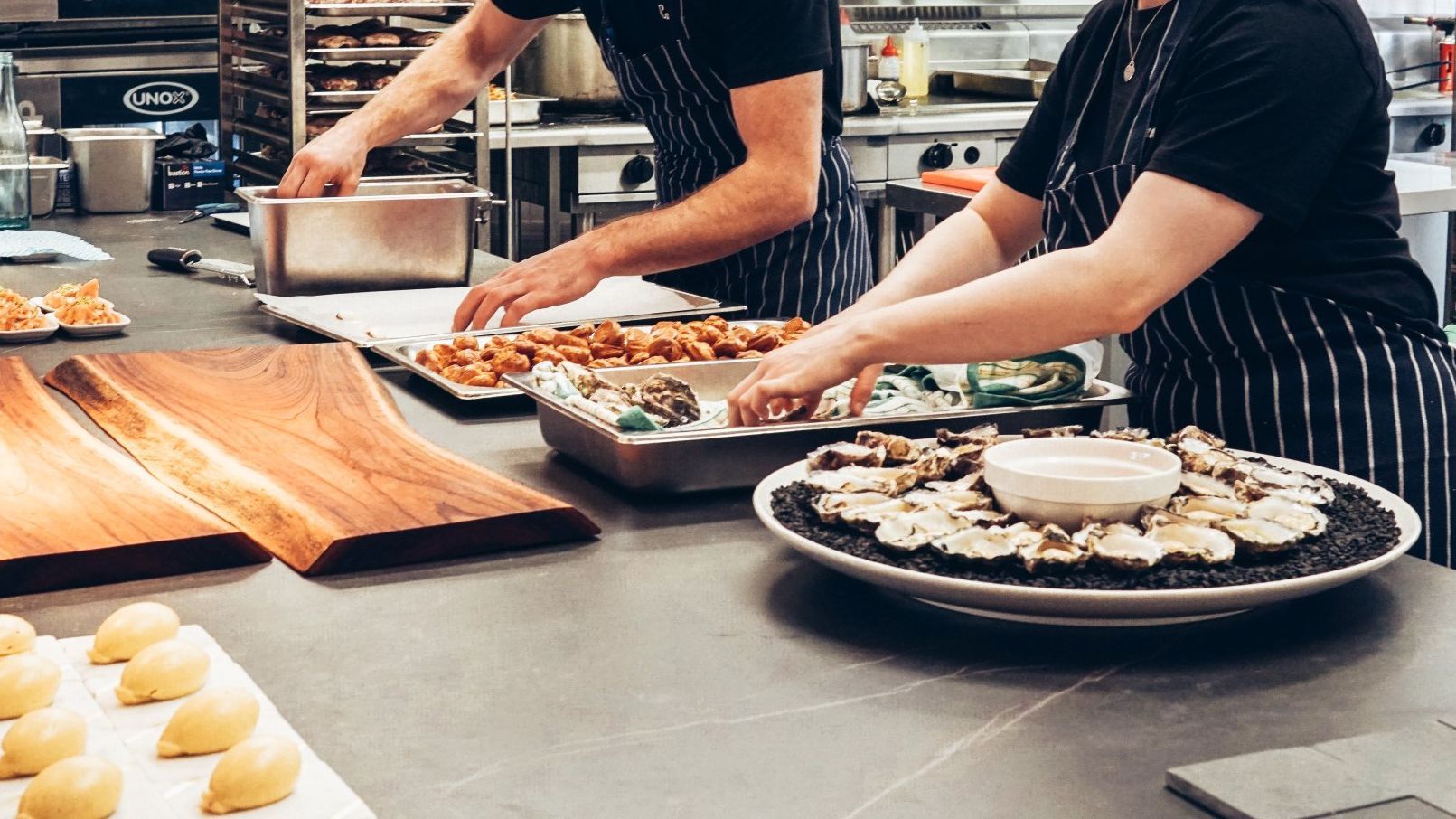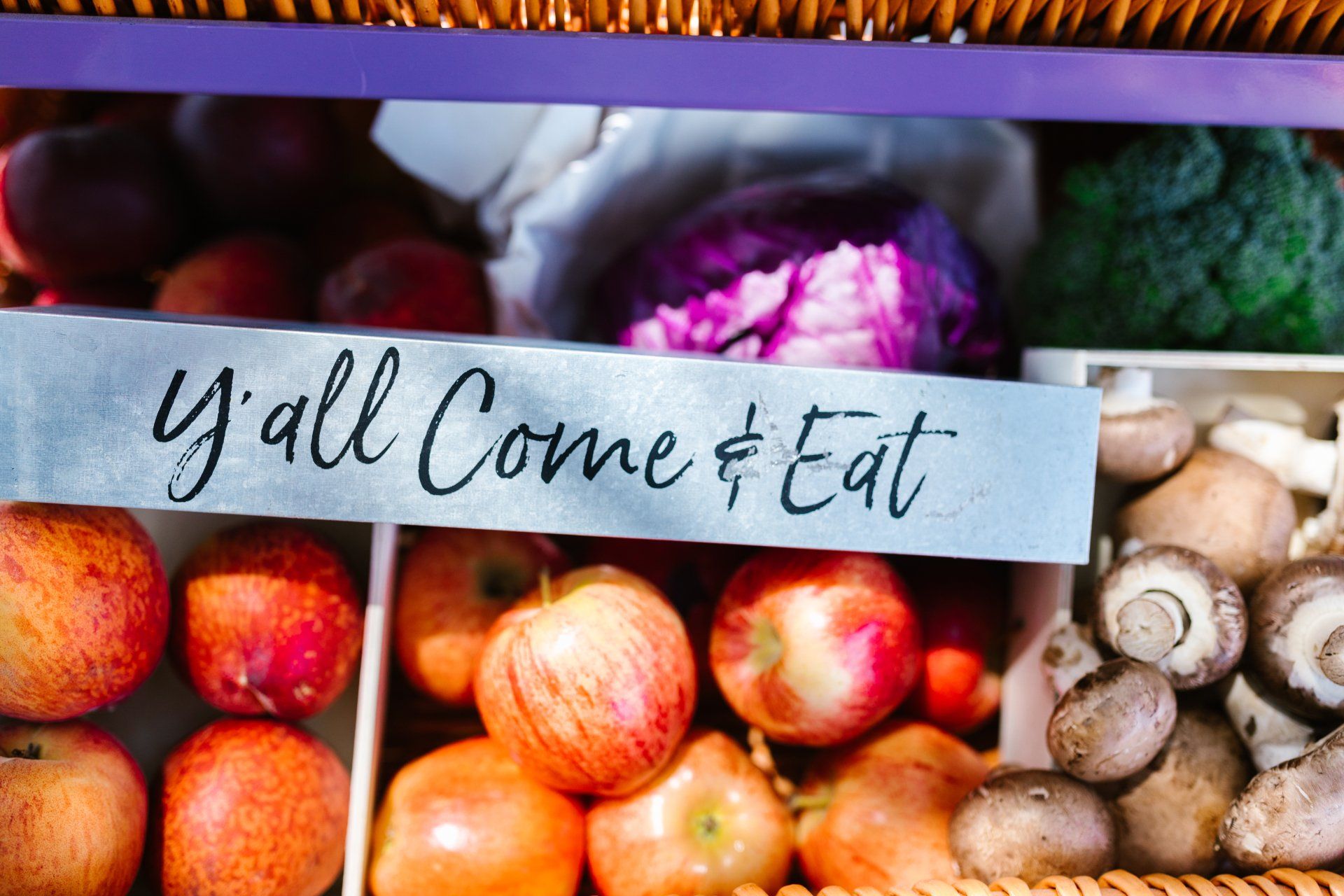Building Strong Supplier Relationships for Hawaii Food Businesses
Chris Wall • January 3, 2024
In the dynamic world of Hawaii's food industry, establishing and maintaining strong supplier relationships is a critical factor in the success of your business. Suppliers play a pivotal role in providing the high-quality ingredients, products, and services that are essential for delivering exceptional culinary experiences
to your customers. This comprehensive article delves into the importance of building strong supplier relationships and offers valuable strategies and tips for cultivating successful partnerships. If you're looking to optimize your supplier network and elevate your Hawaii food business, our consulting company is here to guide you every step of the way.
The Importance of Strong Supplier Relationships:
Consistent Quality and Reliability:
Strong supplier relationships ensure a steady supply of high-quality ingredients and products. By cultivating a strong bond with your suppliers, you can rely on consistent deliveries, reducing the risk of disruptions in your operations. This allows you to maintain the quality and integrity of your offerings, earning the trust and loyalty of your customers.
Competitive Pricing and Cost Savings:
Establishing strong supplier relationships enables you to negotiate favorable pricing and terms. By building trust and demonstrating the value of your partnership, you can often secure better deals, discounts, or volume pricing. This helps you optimize your cost structure, enhancing your profitability and competitive edge in the market.
Access to Specialized Products and Services:
Developing strong relationships with suppliers can open doors to unique and specialized products and services. Suppliers who understand your business needs and goals can offer tailored solutions, introducing you to new ingredients, innovative technologies, or exclusive offerings. This allows you to differentiate your Hawaii food business and stay ahead of the competition.
Strategies for Building Strong Supplier Relationships:
Clearly Define Your Expectations:
Clearly communicate your expectations to your suppliers from the start. This includes factors such as product quality, delivery schedules, pricing, and customer support. By setting clear guidelines, you establish a foundation for a mutually beneficial relationship built on trust and transparency.
Foster Open Communication:
Maintain open lines of communication with your suppliers. Regularly check in, provide feedback, and address any concerns promptly. Establishing a strong communication channel allows for a proactive and collaborative approach to problem-solving, ensuring the smooth operation of your business.
Build Personal Connections:
Invest time and effort in building personal connections with your suppliers. Attend industry events, visit their facilities, and engage in face-to-face meetings whenever possible. Developing personal relationships fosters mutual trust and strengthens the bond between your businesses.
Pay on Time:
Timely payment is essential for maintaining strong supplier relationships. Honor your payment terms and communicate any changes or delays in advance. Prompt and consistent payment builds credibility and reinforces your commitment to your suppliers.
Collaborate and Share Information:
Engage in collaborative efforts with your suppliers. Share information about your business objectives, upcoming promotions, and menu changes. This allows suppliers to align their offerings and support your business goals effectively.
Tips for Maintaining Successful Supplier Relationships:
Stay Updated on Industry Trends:
Stay informed about industry trends, emerging technologies, and new product developments. Share this knowledge with your suppliers, and collaborate to explore innovative ways to enhance your offerings and stay ahead of the competition.
Provide Constructive Feedback:
Offer constructive feedback to your suppliers when necessary. Whether it's about product quality, packaging, or delivery processes, communicate your observations in a respectful and solution-oriented manner. This helps suppliers understand your expectations better and make improvements where needed.
Evaluate Performance Regularly:
Periodically evaluate your suppliers' performance based on predefined metrics. Assess their reliability, responsiveness, and overall contribution to your business's success. Conducting regular performance evaluations enables you to identify areas of improvement and address any issues proactively.
Seek Continuous Improvement:
Encourage continuous improvement by collaborating with your suppliers to streamline processes, optimize product quality, or reduce costs. Embrace a mindset of shared success, where both parties work together to drive positive change and deliver exceptional experiences to your customers.
Reach Out for Expert Guidance:
Building and maintaining strong supplier relationships is a complex and ongoing process. If you're looking to optimize your supplier network and elevate your Hawaii food business, our consulting company specializes in providing expert guidance and support. From supplier selection and negotiation to performance evaluation and improvement strategies, we can help you establish and maintain strong supplier relationships that will enhance your business's success. Reach out to us today to learn how our services can benefit your Hawaii food business.
Conclusion:
Building strong supplier relationships is crucial for the success of Hawaii food businesses. By cultivating these relationships, you can ensure consistent quality, competitive pricing, and access to specialized products and services. Implement the strategies and tips outlined in this article to establish and maintain successful partnerships with your suppliers. Remember, our consulting company is here to offer expert guidance and support in optimizing your supplier network.
Invest in building strong supplier relationships, and watch your Hawaii food business thrive and excel in the dynamic culinary landscape.

By Karen Chang Barr
•
September 16, 2024
Many people start small businesses “accidentally,” by doing side gigs and become popular. When this happens, progress happens so quickly and can take on a life of its own without planning and organization. This can lead to disastrous consequences for some, which can lead to business failure. However, through thought and planning of how to run a growing business, it can evolve into a prosperous business. Setting the business up for success includes developing processes and procedures that can be a lifesaver. 1 An important step that does not get enough attention is analyzing whether or not a potential business idea solves a problem and planning for new business success. Although you may think your business idea is great, it could become a financial black hole to keep it going if you don’t understand your target market–who actually needs your product or service. 2 Another is understanding business finances and developing a business plan. This can be overwhelming, especially if you don’t have a business or financial background. The good news is this hurdle can be overcome by taking business training, creating business planning and projection documents, and finding a mentor to guide you through the startup process. 3 When planning and making financial projections, it’s important to establish good financial best practices to really understand your costs. One key activity is to open a business bank account. This is to help to keep your business and personal finances separate to and track true costs of your income and expenses. 4 If you sell food and accept both cash and digital payments, it’s important to deposit all cash receipts into your business bank account immediately following your popup, farmers market, food truck or festival events. This helps ensure you are accurately capturing your sales revenue. Many entrepreneurs handling cash make the mistake of dipping into the cash box to pay for personal items, which leads to errors in their financial records. 5 Always use your business debit or credit card for all purchases for the business. The goal is to have both revenue and expenses recorded in your bank account, which helps to manage your finances. 6 Use an online financial accounting software to track all transactions and easily generate reports about the business. Many software options offer mobile apps for business customers to access their financial information anywhere. These programs can directly connect with business bank accounts and can transfer the bank records to the software to show up-to-date financial information about the business. 7 Save your business transaction receipts, especially when cash is used to make business purchases. These transactions will be needed to add to the accounting software, either through the app, or through manual entry. 8 Another tip for managing business finances is to create a main business bank account for revenue and set up accounts to serve for specific purposes. You can make it part of your regular process to transfer predetermined percentages to these accounts. This helps to avoid overspending what’s in the main account and encounter shortfalls when it’s time to pay expenses. It also allows you to designate profit for yourself. It may take some time to start “paying yourself profit,” by diligently tracking your business finances, you can make this happen. Some recommended categories are: Profit Operations Taxes By being organized and creating best practices and procedures, small business entrepreneurs can keep better track of their finances and be prepared to pay important expenses. Not only is this a critical part of running a small business, but also minimizes the stress from scrambling at the last minute to understand the finances, pay important bills, and run a successful business that can grow and flourish.

By Ritchel Escalona
•
May 22, 2024
What are Customer Relationships? Customer relationships describe the interactions a business has with its customers or clients and are crucial whether you’re a microenterprise, corporate entity, or government organization. These interactions involve how you acquire customers (inbound), retain them, encourage them to purchase more products or services (upsell), and keep them informed about additional value your organization offers (outbound). According to the Business Model Generation, customer relationships are the connections a business establishes with different customer segments. These relationships can be personal or automated, short-term or long-lasting, and can even evolve into a micro community. Why are Customer Relationships Important? Customer relationships are crucial because they influence the customer journey and can significantly impact the cycle of repeat business. When customers feel valued and heard, their satisfaction increases, enhancing the likelihood of continued business and positive referrals to new customers. How to Determine Your Customer Relationship Strategy By understanding customer segments, your desire to serve is significant to shaping the customer relationship experience. For instance, if your goal is to be highly automated with minimal human interaction, you will attract customers who prefer a hassle-free transaction for their products. On the other hand, if your goal is to build strong relationships with each customer, consider in-person interactions and regular touchpoints through newsletters, community events, or other personal communication methods. Regardless of the type of relationships you choose to establish with your customers, it’s essential to understand the business process, identify your target audience, and decide on the nature of your interactions. The customer experience plays a critical role in shaping how customers engage with your business and will pave the way for your business's future success.

By Ritchel Escalona
•
April 24, 2024
Are you looking to attract more customers and grow your street or mobile food business in Hawai`i? Understanding the different communication channels and identifying and using the right ones to connect with specific customer demographics can significantly boost your brand, enhance your customer base, and strengthen your foodie community. The Entrepreneurial Spark Many street food entrepreneurs begin their journey organically and unexpectedly. You might have catered to a large gathering and received glowing reviews or participated in a festival where your food idea was a hit. Whatever your inspiration, it's crucial to leverage that initial success into a sustainable business. Assessing the validity of your business idea and creating a business model canvas (1-page business plan) will help map your success. One important element is identifying the channels you’ll use to communicate your brand and interact with your customers. Mastering Communication Effective communication with your audience is essential, not just for sharing your daily menu but for building lasting relationships. Your customers need opportunities to interact with you, whether to praise your dishes, inquire more about your offerings, or provide feedback. Key Communication Methods Understanding and utilizing various communication methods will help you effectively reach and engage your audience: 1. Verbal Communication : This can be direct conversations at your food cart or through digital means like phone calls and virtual meetings. Such interactions create a personal touch that can differentiate your business. 2. Written Communication : Keep your customers informed and engaged through texts, emails, social media posts, and even traditional methods like flyers and postcards. These tools are vital for announcing your location, specials, or changes in service hours. 3. Nonverbal Communication : The way you present yourself and interact with customers can speak volumes. Body language, eye contact, and even the setup of your stall contribute to how customers perceive your business. These cues, though subtle, are powerful in person or through video. Choosing the Right Channels Selecting appropriate communication channels is crucial. Different customers may prefer different types of interactions. For instance, younger customers might engage more with social media updates, while others may value face-to-face communication. Listening to customer feedback is key—it can inspire new dishes and help refine your approach. Engaging to Grow Communication should be a two-way street. It's not just about selling; it's about engaging in a manner that encourages customers to participate in your business's growth. This could mean involving them in menu decisions or making them feel like part of your brand's community. Conclusion For street and mobile food vendors, especially in a diverse place like Hawai`i, understanding how to communicate effectively is more than a necessity—it's a strategy for growth. By choosing the right channels and fostering genuine interactions, you can turn casual eaters into loyal customers and active promoters of your business.

By Karen Chang Barr
•
January 2, 2024
Embarking on the journey of starting a food business is definitely thrilling, especially when your passion for a particular culinary concept is the main focus in your day-to-day thoughts. I often refer to it as the "Lala land stage" (where all you can think of is the fairy tale version of starting your business where no challenges exist), envisioning the success of your venture seems effortless. Whether it's the nostalgic flavors of your ethnic cuisine, a beloved dessert, or the dream of operating a bustling food truck, the key to a thriving food business lies in careful planning and realistic cost projections. Having collaborated with a number of commercial kitchen food trucks and other mobile food businesses clients, I've observed a common pitfall: overspending (and getting into personal financial debt) due to a lack of understanding about costs and separating personal from business finances. Many entrepreneurs find themselves grappling with the financial strain of extensive menus without a clear comprehension of the associated expenses. This leads to challenges such as insufficiently pricing items to cover production costs and lacking a profitable margin. Here are crucial considerations when launching your small food business: Startup Costs: Determine the initial investment required to launch your business. Monthly Operating Costs : Identify recurring expenses your business will incur Projected Monthly Revenue: Estimate your expected income. Compliance and Tax Costs: Factor in costs related to regulatory compliance and taxes Available Startup Capital: Assess the funds you have at your disposal. Additional Funding Needs: Determine how much extra capital you’ll require. Break-Even Analysis: Calculate the sales needed to cover the costs and break even. Developing a startup cost projection worksheet aid in understanding the financial landscape of your venture will be beneficial. It provides insights into the costs, your financial contribution, and additional funding requirements. Equally important is creating a 12-month or 2-year monthly projection of revenue and expenses. This serves as a roadmap, indicating the volume of sales needed to cover expenses and achieve profitability. While these documents are initially estimates, they form a foundation for understanding your business's financial dynamics. Over time, you'll refine your projections based on real-world outcomes. Pay particular attention to determining the cost of production for each menu item and be sure to include overhead. This knowledge enables you to price products effectively, covering expenses and generating profit. Consider starting with a limited menu to gauge customer preferences before expanding. Regularly review and adjust your projections based on performance, enhancing efficiency and fostering the successful growth of your small food business. Understanding costs, making informed financial predictions, and adapting to market dynamics

December 1, 2023
Discover how online reviews can be a game-changer for your Hawaii food business. This exciting article explores the impact of positive reviews, strategies to generate more reviews, and how our consulting services can help you leverage the power of online feedback to grow your business and attract new customers.

November 1, 2023
Craft an irresistible menu for your food business in Hawaii with these expert tips. From incorporating local flavors to balancing variety and simplicity, this blog post offers valuable insights to attract customers and maximize your business's success. Discover how our food business consulting service can help you create a menu that stands out in Hawaii's culinary landscape.
Office
808-809-4BIZ (4249)
Email us
Subscribe to our newsletter
Contact Us
Thank you for contacting us.
We will get back to you as soon as possible.
We will get back to you as soon as possible.
Oops, there was an error sending your message.
Please try again later.
Please try again later.
© 2025
All Rights Reserved | Ho‘onui LLC
Hawaii Food industry Web & Marketing Services Provided by Strafford Media





